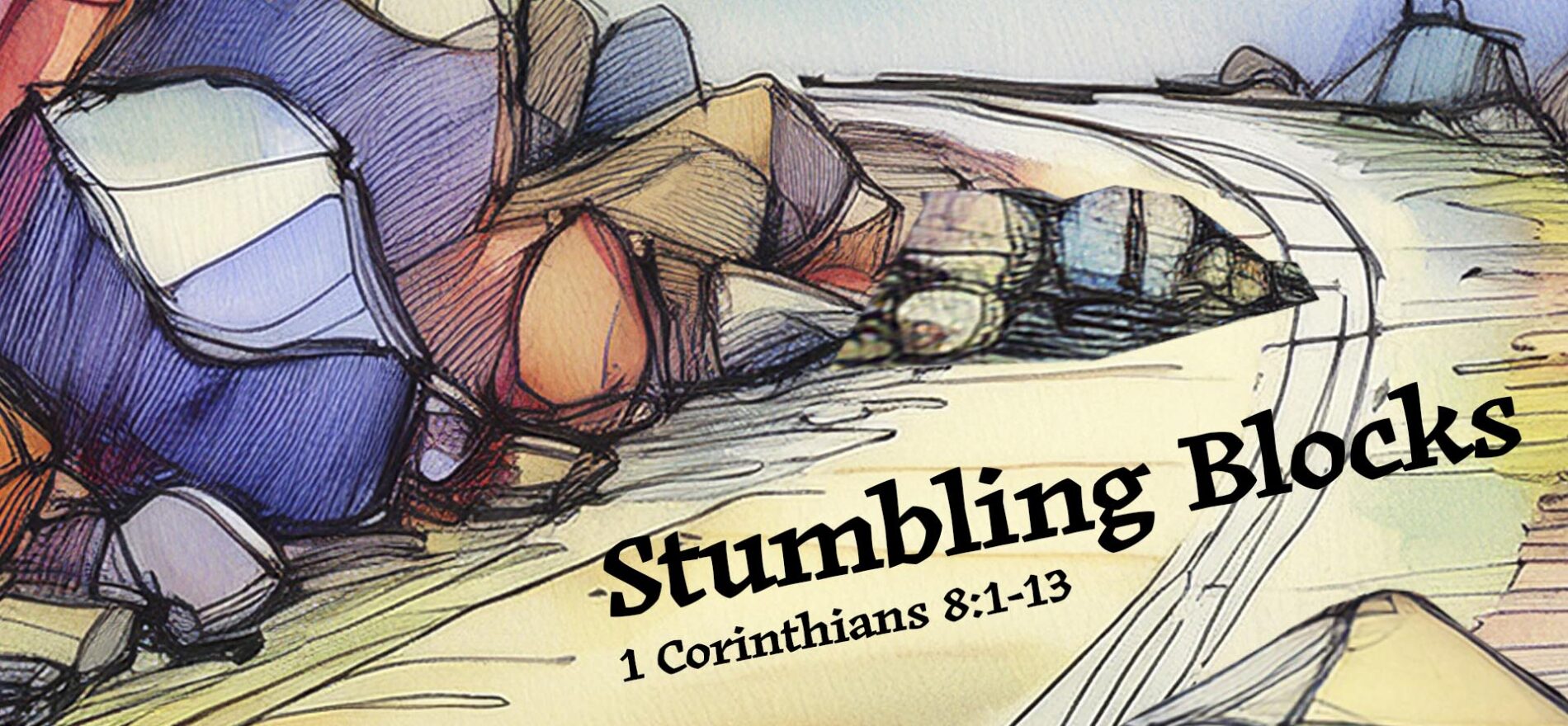[Transcript]
Paul’s primary point in chapter eight isn’t difficult to discern, but the path to get there is fraught with challenges. Verse thirteen is clear, but it isn’t clear precisely what Paul meant by “knowledge” nor is it clear what the Corinthians meant when they said “all of us possess knowledge.” We will spend some of our time untangling the first half of chapter eight so that verse thirteen will be cast in a proper context.
“Now concerning food offered to idols: we know that ‘all of us possess knowledge.’ This ‘knowledge’ puffs up, but love builds up.” – 1 Corinthians 8:1
The first hurdle to overcome relates to how the quote, ‘all of us possess knowledge,’ connects with food offered to idols. What did the Corinthians mean by this? Whatever they meant, Paul quickly corrected them and pointed out that their ‘knowledge’ was making them arrogant. Something about their beliefs about food offered to idols was unloving.
What was this knowledge? Scholars differ on this issue. However, broadly speaking, a summarizing description can be stated like this: the Corinthians believed the Holy Spirit gave them special knowledge—which isn’t entirely untrue since spiritual truth can only be understood by spiritual people (2:13). Nonetheless, they expected all believers at all stages of growth to embrace their particular understanding.
This seems to be a reasonable explanation of their knowledge. Paul unpacks some of the specifics of what they believed in the next few verses. First, they believed that “an idol has no real existence.” This shouldn’t be misunderstood. This statement is referring to the physical statue or graven image that was worshiped. The Corinthians understood that men created that statue, and anything created by men cannot be a god. However, this doesn’t mean there aren’t spiritual beings receiving the worship given to those idols.
“For even if there are so-called gods, whether in heaven or on earth (as there are many gods and many lords)” – 1 Corinthians 8:5 NKJV
Second, because they knew those idols were lifeless—even if they did represent rebelling spiritual beings—their worship was reserved only for the one true Lord of all and His Son, Jesus Christ. They understood that He alone created all things, including the rebelling spirits behind idols, and therefore, any meat sacrificed to those idols meant nothing to them. In all of this, Paul did not correct their belief but instead affirmed it.
However, they were still wrong despite having the right beliefs.
I’ve been here. I’ve been the guy with the right beliefs, but still in the wrong. It’s unbelievable, looking back, how arrogant I had become. I can argue theology with the best of them, but what good is that if I’m harming people in the wake of my rhetoric? Even if I’m a super nice guy about it, if I’m harming other people’s faith, I’m wrong. Obviously, if we’re disagreeing on something foundational, like Jesus rose from the grave, or the virgin birth, then if my nice rhetoric still injures you, I can’t help that. But that’s not what Paul is dealing with here, nor I. We’re talking about intramural disagreement and how to navigate it. These folks are already brothers, but one is harming the other with his beliefs.
“But take care that this right of yours does not somehow become a stumbling block to the weak.” – 1 Corinthians 8:9
First, let’s understand that Paul never uses the description of “weak” in a disparaging way. He also mentions it in Romans chapter fourteen. In both cases, he referred to less mature believers. They haven’t yet learned what the more mature have learned. Additionally, there is a case for people who may possess the same theological knowledge, but due to previous experiences, cannot arrive at the same conclusions as others.
We likely know both types. For sure, there are people in the faith who were actually “born yesterday” in that they have only recently been saved. We (hopefully) don’t expect them to live like someone who has known the Lord for years. There are also believers who lived a certain way before they were saved, and because of that, they can never again do certain things, even if those things aren’t technically sinful.
Paul admonished the Corinthians for their sake. These weaker brothers had not yet learned the knowledge that the Corinthians were reveling in (8:7). Paul reminded the church that some of these brothers once worshiped the idols to whom this meat was sacrificed. Their insistence on eating that meat was harming their weaker brothers’ consciences. Though the eaters had good theology, they had unloving practice. Instead of building up their new brothers in love, they were tearing them down with freedom.
Perhaps you’ve been on both sides of this. I have. I’ve been the younger believer put off by the behavior of older saints. And I’ve also been the older saint, forgetting what it’s like to be young in the faith. As a saint of 32+ years, I should do the work to put myself back in the shoes of someone who’s been saved for a year or less. How impressionable was I during that time? Very! How seriously should I take it, then, when it comes to younger believers watching how I practice my faith? VERY!!
“Therefore, if food makes my brother stumble, I will never eat meat, lest I make my brother stumble.” – 1 Corinthians 8:13
In verse eight, Paul made a case for his point: “We are no worse off if we do not eat, and no better off if we do.” If there is no real loss from abstaining and no real gain from participating, why bother with it at all? This is a plea to purge pointless things from our lives. “Food will not commend us to God.” In other words, what’s the point if this activity isn’t building the kingdom and storing treasures in heaven? We’ve already heard Paul make pleas for people to maximize their lives for kingdom work, whether married or single. This thought is in that same vein. If there isn’t a kingdom purpose, don’t waste your time with it.
Now, consider how this offends your brother’s conscience. Not only is this activity of no eternal value, but it also undermines someone else’s faith. This represents a miscarriage of freedom. Enjoying freedom at the expense of another’s conscience isn’t loving. In the Lord’s kingdom, the greatest freedom is found in serving others, not in ensuring that your freedom is exercised.
I’m positive that as we read further into the next couple of chapters, we’re going to get deeper into the whole freedom in Christ subject and what that means for how we exercise our faith. Let me give you an example from my life. When I lived in Colorado, I went to wine making. I have never been drunk a day in my life, and I don’t have an enormous love for wine, but I do like trying to figure things out and do them well. The process of wine-making was fascinating to me, so I began trying it myself, attempting to get good at it. It wasn’t a huge secret, and I spoke about it openly with others. I was never confronted by anyone who took offense to it, nor was I giving it away. I was only making small amounts. But when I moved to MO, I found out quickly that there was a sizeable number of people in our church who went through recovery from alcohol and drugs. I couldn’t in good conscience continue with my hobby. I didn’t want my liberty to cause them to stumble.
“For if anyone sees you who have knowledge eating in an idol’s temple, will he not be encouraged, if his conscience is weak, to eat food offered to idols?” – 1 Corinthians 8:10
Depending on your background, you may have come from a church tradition that emphasizes avoidance of things that could be a stumbling block for others. For example, many churches embrace a teetotaling position, meaning Christians should never consume alcoholic beverages. Why do they embrace this position when the Scripture only calls drunkenness a sin? If one can consume alcohol without becoming drunk, why should he or she abstain? Typically, the answer given is to avoid becoming a stumbling block to others.
In verse ten, Paul essentially described relapse triggered by inconsiderate brothers. The weaker brother is bothered by the meat from the idol’s temple, but because of peer pressure, violates his conscience about the meat. In the weaker brother’s heart, he’s participating in idol worship, which would be sinful for him.
When we don’t consider the conscience of others, we may lead them into sin, even though what we’re doing may not be a sin for us. Hence, “by your knowledge this weak person is destroyed.” Do not take your brother’s conscience lightly. If he voices his reservations, honor them. It’s a simple thing to do, yet this has been an ongoing problem in the church from the start. So let me end with a final question: Why do we struggle so much to crucify the streak of selfishness that insists on exercising our freedom?







